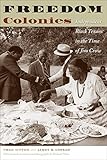Freedom Colonies : Independent Black Texans in the Time of Jim Crow / / Thad Sitton, James H. Conrad.
Material type: TextSeries: Jack and Doris Smothers Series in Texas History, Life, and CulturePublisher: Austin : : University of Texas Press, [2010]Copyright date: ©2005Description: 1 online resource (256 p.)Content type:
TextSeries: Jack and Doris Smothers Series in Texas History, Life, and CulturePublisher: Austin : : University of Texas Press, [2010]Copyright date: ©2005Description: 1 online resource (256 p.)Content type: - 9780292797123
- 333.335089960730794
- online - DeGruyter
| Item type | Current library | Call number | URL | Status | Notes | Barcode | |
|---|---|---|---|---|---|---|---|
 eBook
eBook
|
Biblioteca "Angelicum" Pont. Univ. S.Tommaso d'Aquino Nuvola online | online - DeGruyter (Browse shelf(Opens below)) | Online access | Not for loan (Accesso limitato) | Accesso per gli utenti autorizzati / Access for authorized users | (dgr)9780292797123 |
Browsing Biblioteca "Angelicum" Pont. Univ. S.Tommaso d'Aquino shelves, Shelving location: Nuvola online Close shelf browser (Hides shelf browser)

|

|

|

|

|

|

|
||
| online - DeGruyter Quality Education for Latinos and Latinas : Print and Oral Skills for All Students, K-College / / | online - DeGruyter The Great Syrian Revolt and the Rise of Arab Nationalism / | online - DeGruyter First World Third Class and Other Tales of the Global Mix / | online - DeGruyter Freedom Colonies : Independent Black Texans in the Time of Jim Crow / / | online - DeGruyter Border Identifications : Narratives of Religion, Gender, and Class on the U.S.-Mexico Border / | online - DeGruyter Demosthenes, Speeches 18 and 19. | online - DeGruyter Austin, Cleared for Takeoff : Aviators, Businessmen, and the Growth of an American City / |
Frontmatter -- Contents -- 1. Introduction -- 2. A Terrible Freedom -- 3. Making Do, Getting By -- 4. Saturday Nights and Sunday Mornings -- 5. School Days -- 6. Working for the Man -- 7. Decline and Remembrance -- Appendix: Freedmen's Settlements and Other Rural African American Landowner Communities, by County -- Notes -- Bibliography -- Index
restricted access online access with authorization star
http://purl.org/coar/access_right/c_16ec
In the decades following the Civil War, nearly a quarter of African Americans achieved a remarkable victory-they got their own land. While other ex-slaves and many poor whites became trapped in the exploitative sharecropping system, these independence-seeking individuals settled on pockets of unclaimed land that had been deemed too poor for farming and turned them into successful family farms. In these self-sufficient rural communities, often known as "freedom colonies," African Americans created a refuge from the discrimination and violence that routinely limited the opportunities of blacks in the Jim Crow South. Freedom Colonies is the first book to tell the story of these independent African American settlements. Thad Sitton and James Conrad focus on communities in Texas, where blacks achieved a higher percentage of land ownership than in any other state of the Deep South. The authors draw on a vast reservoir of ex-slave narratives, oral histories, written memoirs, and public records to describe how the freedom colonies formed and to recreate the lifeways of African Americans who made their living by farming or in skilled trades such as milling and blacksmithing. They also uncover the forces that led to the decline of the communities from the 1930s onward, including economic hard times and the greed of whites who found legal and illegal means of taking black-owned land. And they visit some of the remaining communities to discover how their independent way of life endures into the twenty-first century.
Mode of access: Internet via World Wide Web.
In English.
Description based on online resource; title from PDF title page (publisher's Web site, viewed 18. Sep 2023)


